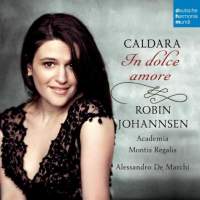Texte paru dans: / Appeared in:
*

GRAMOPHONE (Awards/2014)
Pour s'abonner /
Subscription information
DHM 88843011692

Code-barres / Barcode : 0888430116924
Consultez toutes les évaluations recensées pour ce cd
~~~~ Reach all the evaluations located for this CD
Reviewer:
David
Vickers
Caldara ‘In dolce amore’ Adriano in Siria – Numi, se giusti siete. Demofoonte – Se tutti i mali miei. I disingannati – Una donna. Scipione Africano – Figlia a Roma; In dolce amore. Scipione nelle Spagne – Pensieri di amante. Temistocle – Chi mai d’iniqua stella. Begl’occhi adorati. Credea Niso. Rotte l’aspre catene Robin Johannsen sop Academia Montis Regalis / Alessandro De Marchi Deutsche Harmonia Mundi F 88843 01169-2 (73’ • DDD)
The Venetian Antonio Caldara worked at the Imperial court in Vienna from summer
1716 until his death 20 years later. Robin Johannsen performs arias from six Viennese operas, some of which were first settings of new librettos by the court poet Metastasio. A pair of warbling recorders adorns Sabina’s touching siciliano ‘Numi, se giusti siete’ from Adriano in Siria (1732), and Johannsen sings with limpid sweetness in Emilia’s ‘In dolce amore’ from Scipione Africano (1735). There are judicious contrasts in dramatic situations and musical moods, such as the unjustly condemned Dircea’s chromatically expressive ‘Se tutti i mali miei’ from Demofoonte (1733) in comparison to the flirtatious comedy of Dorina’s ‘Una donna’ from I disingannati (1729).
Another strand is three cantatas written in Rome during Caldara’s years as Prince Ruspoli’s maestro di cappella (1709-16; in preceding years Handel unofficially provided similar music for Ruspoli’s conversazioni). The Roman disciples of Corelli would have felt at home in the sinfonia that introduces Begl’occhi adorati (1715). Academia Montis Regalis adopt a jagged manner to convey the shepherd Fileno’s torment in ‘L’ardor che in petto sento’; an understated approach to the sarabanda might have hinted astutely at the ecstasy of his suffering love. An unhappy lover complains that Cupid has destroyed his brief experience of peaceful contentment in Rotte l’aspre catene (1715), whereas the bossy Irene scolds her fickle boyfriend in Credea Niso (1712). Academia Montis Regalis and Alessandro De Marchi accompany with robust directness or lighter delicacy as required, and Johannsen’s versatile singing helps to reveal an enriching glimpse of Caldara’s virtues.
Cliquez l'un ou l'autre
bouton pour découvrir bien d'autres critiques de CD
Click either button for many other reviews


